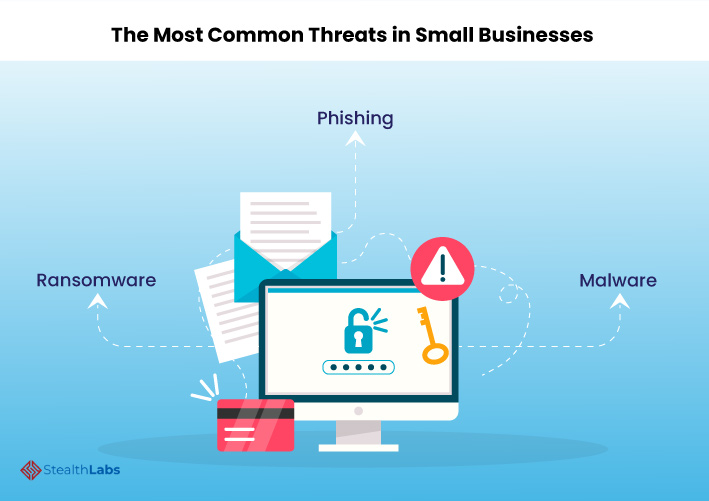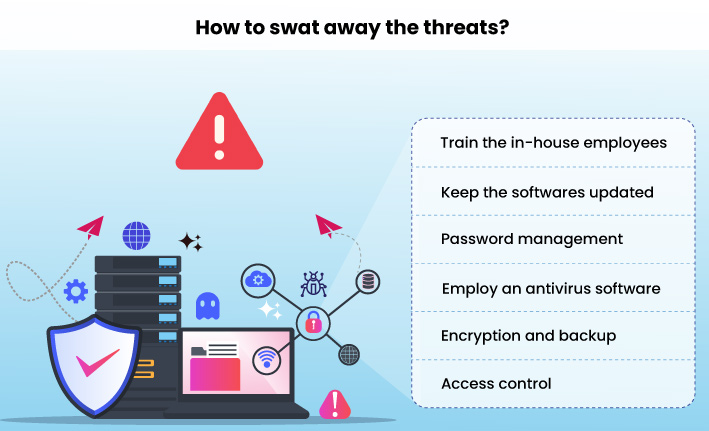Cybercriminals are getting smarter with every passing day. From ransomware to data thefts, cybercriminals fire every arrow in their quiver to impede any good business organization, regardless of the scale. Although small businesses feel they are too small of a target to be decimated, a malicious mind wouldn’t deem it.
As per the U.S. Small Business Administration survey, 88% of the small businesses felt their enterprises were easy cybercrime targets. Yet, despite this concurrence, small entrepreneurs didn’t double down on their security for various reasons.
From not knowing where to begin to a lack in-house cybersecurity staff, small businesses are yet to understand how to fortify their entrepreneurial cyber posture.
Let’s understand better how small businesses can avoid falling prey to cybercrimes.
The Most Common Threats that Small Businesses Face
Although danger lurks everywhere, cybercriminals have favored few malicious threats. Let’s have a look at what they are.

Ransomware
Ransomware became infamous after the world reviled in the face of the WannaCry attack. Typically, the malicious actors are delivering dangerous software that encrypts the digital files once activated. Until a ransom is paid to the criminals, the files are held hostage. The gaps in the cybersecurity systems are exploited for these unlawful activities. Off late, ransomware attacks have increased, and various companies have paid a hefty price for being lax on security.
Phishing
Phishing is a derivative term from angling. The criminals bait the gullible businesses by dangling an unsuspecting link by packaging the malicious software in a mail or as a mail link. Once clicked, the company servers generally become the hotbed for criminal activity. In some cases, the cybercriminals implant trojan software that lies dormant in the servers. This allows the criminals to scout the servers for loopholes. If the trojan is undetected, it poses immense danger to any organization as the criminals have the scope to plan and implement their con meticulously.
Malware
Malware is a generic term for any software propped for vicious or criminal usage. It can seep into the servers in any way unless one is diligent enough to double down on security.
Also Read: Top 10 Cybersecurity Trends in 2021 and Beyond!
Cyber Security Advice For Small Businesses
Although employing a security team would be wise, not every business can afford one. So instead, small businesses can stave off these attacks with the following cyber security advice.

Train the in-house employees
The employees should be trained and be told not to indulge in any potentially dangerous activity. The employees should also be vigilant on the mail attachment and links they receive. The malicious attachments come in all shapes and sizes. This aspect puts the onus on the business owner to stipulate a security protocol regarding what an employee should do when handling suspicious mail. That said, the employees are equally responsible. The employees should exercise due diligence when going about business activities.
Keep the Software Updated
People tend to ignore software updates for various reasons. However, small business owners should understand software updates are iterations meant to better the existing solutions. Often, the security is also upgraded in the background with these updates. Hence, staying updated on the software front is pertinent for any business.
Also Read: Cyber Security Services for Education & Research Institutions
Employ an antivirus software
Roping in a security team is costly for some. However, propping the system servers with a strong antivirus is an aspect that enterprises need to consider. The antivirus will identify and delete the mail attachments to virus-laden flash drives deftly. Additionally, having the data backed up is advisable. If cybercriminals infiltrate the primary servers, the backup servers can be harnessed to resume operations.
Password management
One can’t stress enough about creating a strong password. Ideally, the password should have a minimum of 10 characters, one uppercase letter, a lowercase letter, a number, and a special character. In addition, it is wise to have an unintelligible word as a password. This meaningless password will trim the possibilities to be a target.
Encryption and Backup
Encryption is vital for any organization. Keeping the data tucked away in a garbled format will be useless for any person without credentials. Additionally, having the data backed up is advisable. If the primary servers are infiltrated by cybercriminals, the backup servers can be harnessed to resume operations.
Access control
Having a defined identity access policy is a must. However, small businesses should also have a physical access policy to which employees can access which computer in which locations. With separate user accounts and user-specific access to resources, the chances of compromising servers are stunted.
Capping it off
It is terrific and terrifying what a single click can do. Across the world, company of every size can be a target. Every small business administrator should take cognizance of the rising threats and incorporate the necessary changes. One has to acknowledge the bitter truth that cybercrime is now of the biggest businesses in the world. With crime running rampant, it is wise to harness the services of a security consultant.
Stealthlabs is one of the leading figures in the security arena. We assess your business needs and dole out a solution that is best for you. So, reach out to us and secure your enterprise.
More Articles:
- Cybersecurity: DNS Attacks Cost USD 924,000 on Average
- Autonomous Car Security: Adversarial Attacks Against New Mobility!
- Connected Car Security: The Future of Automotive Industry
- President Biden Proposes USD 10.19Bn to Strengthen US Cybersecurity!
- Top 8 Mobile Cybersecurity Threats You Should Know to Protect Your Data!
- Future of Cybersecurity: 5 Trends That Need Close Monitor!

